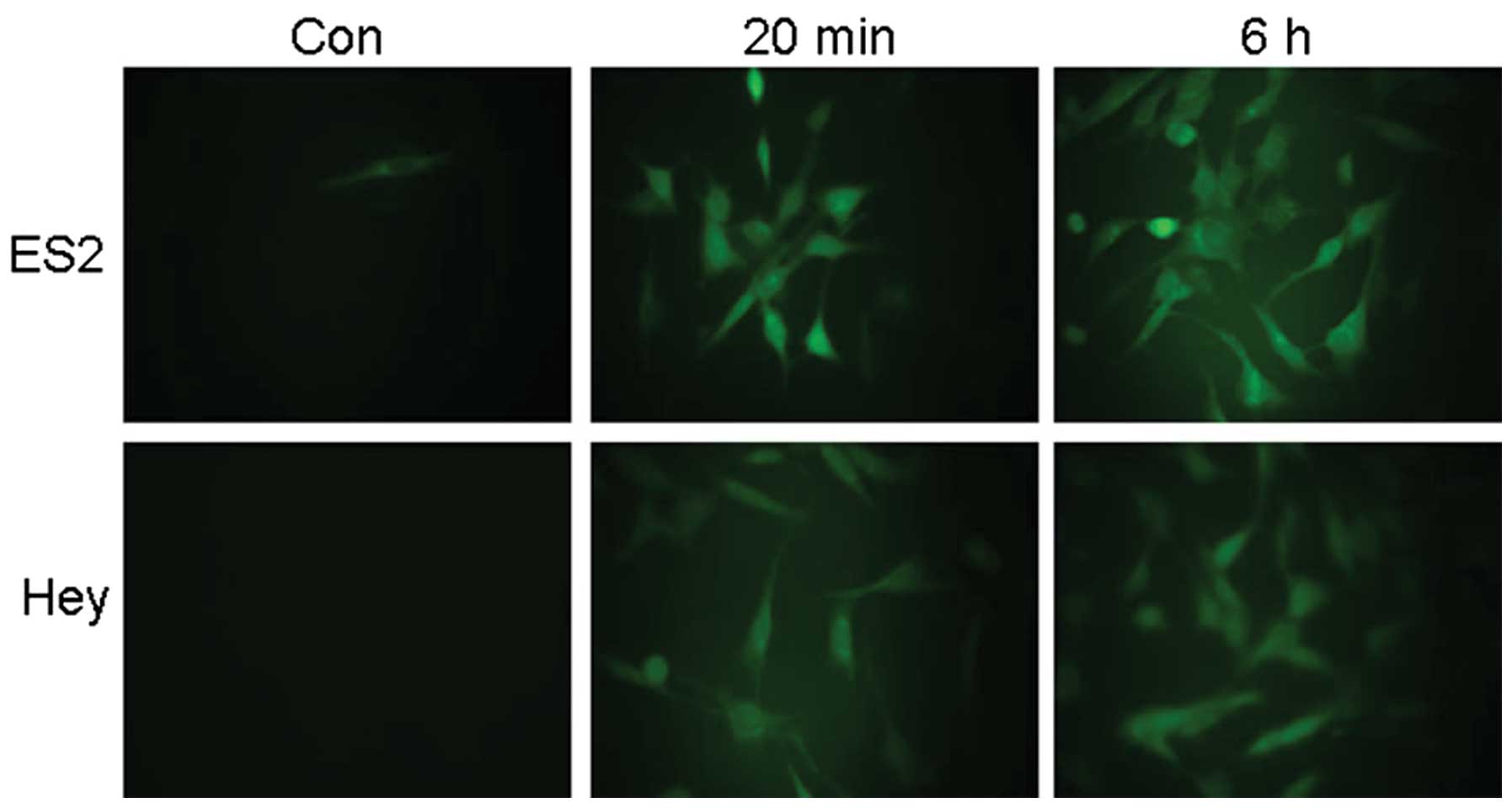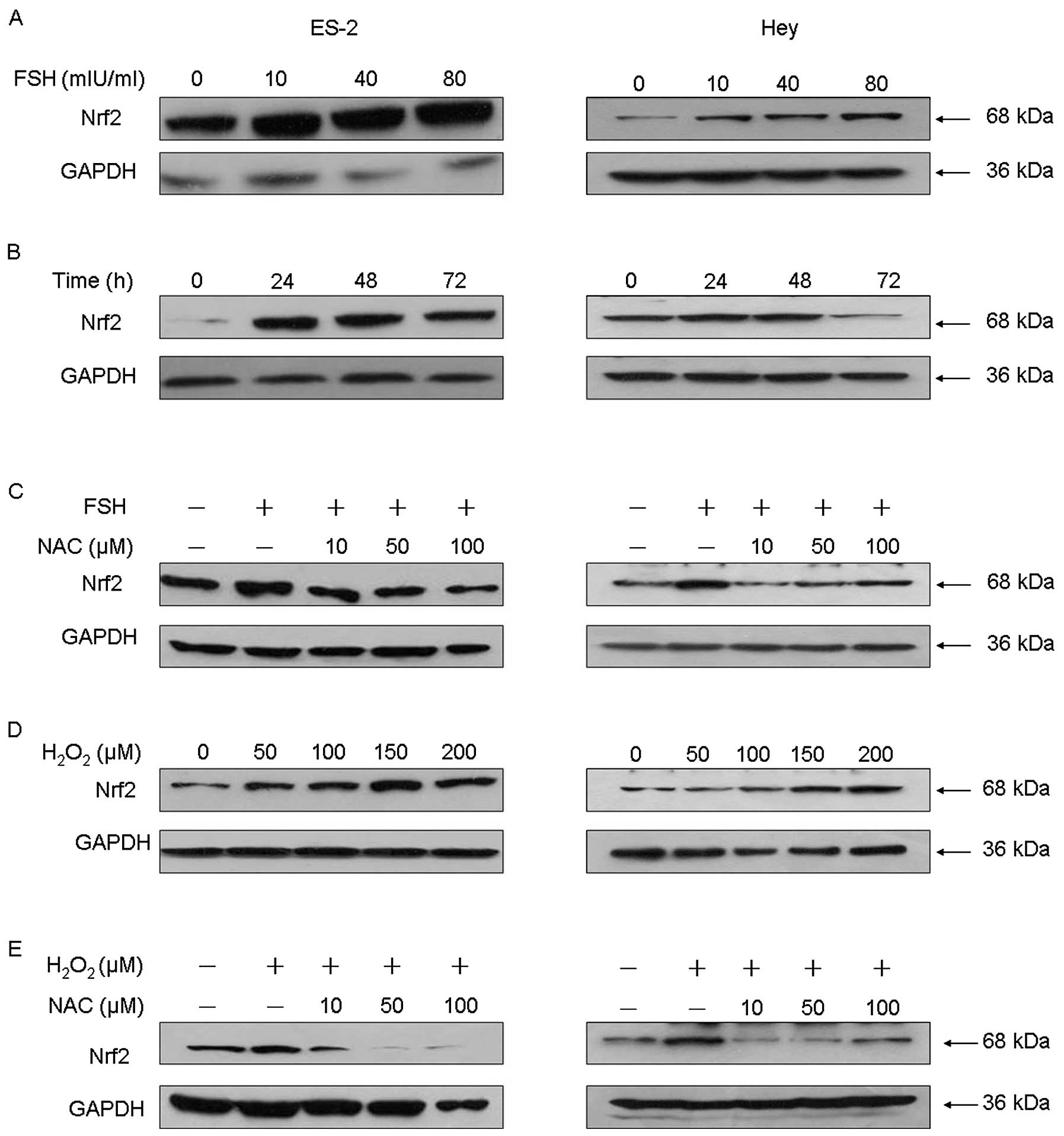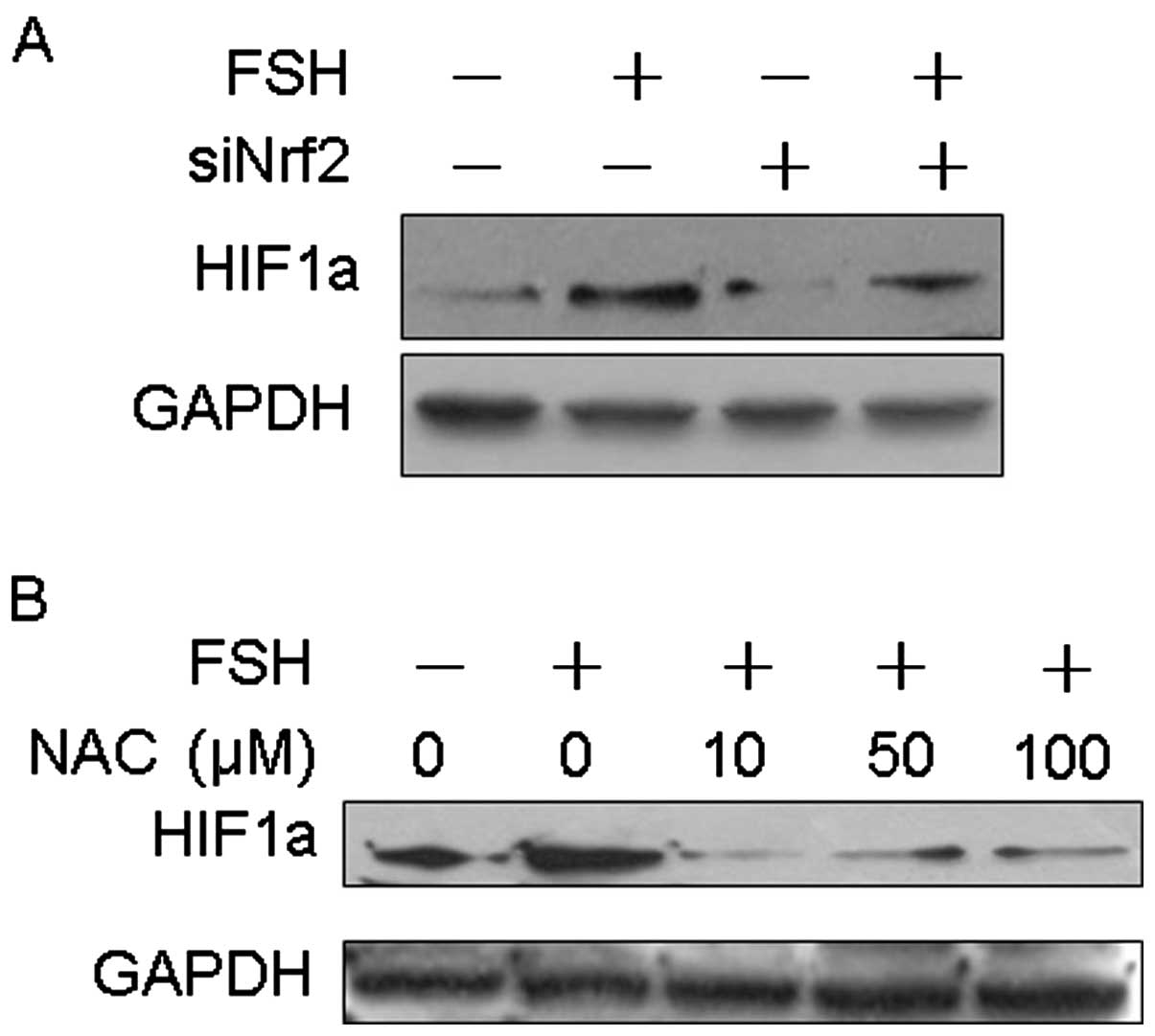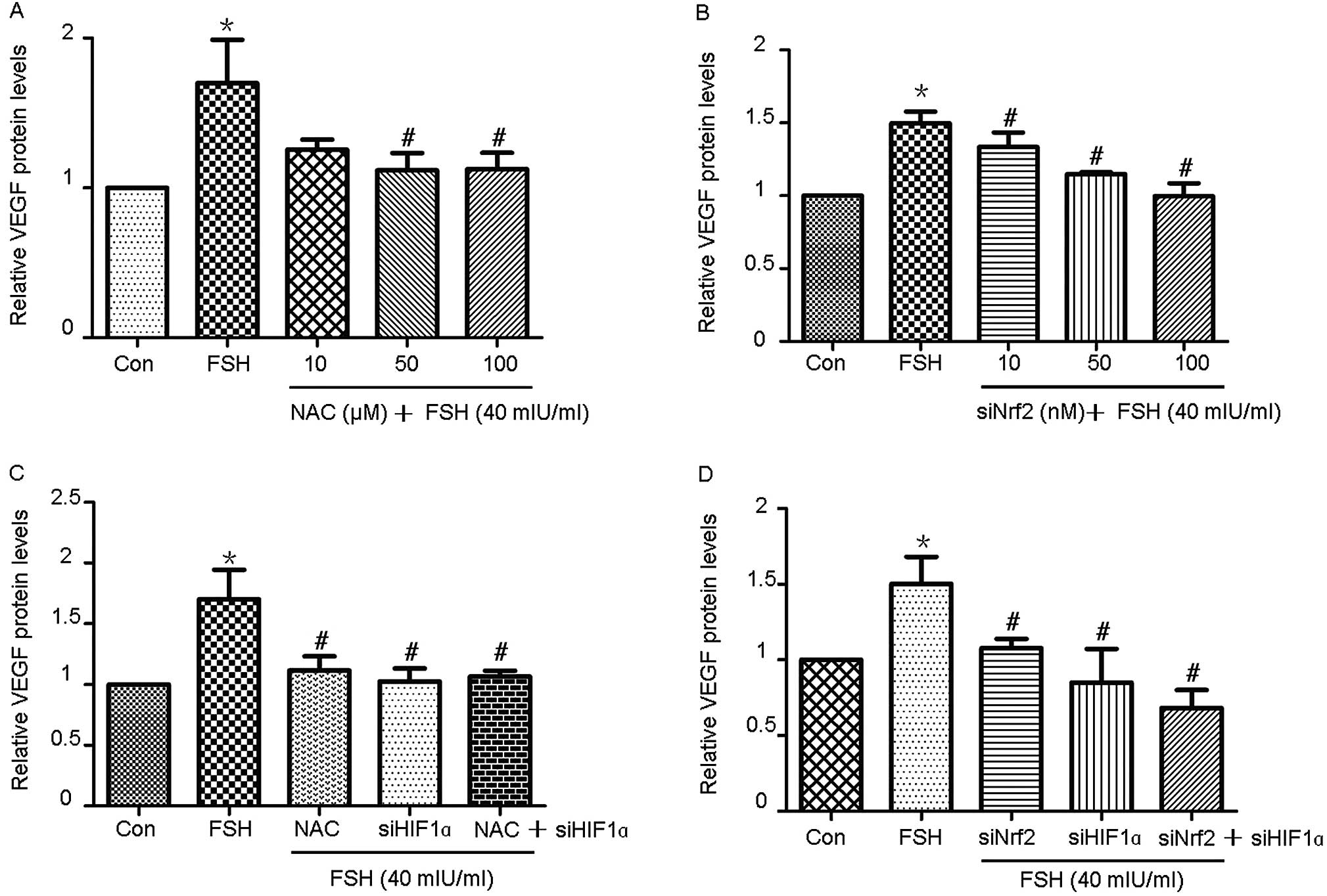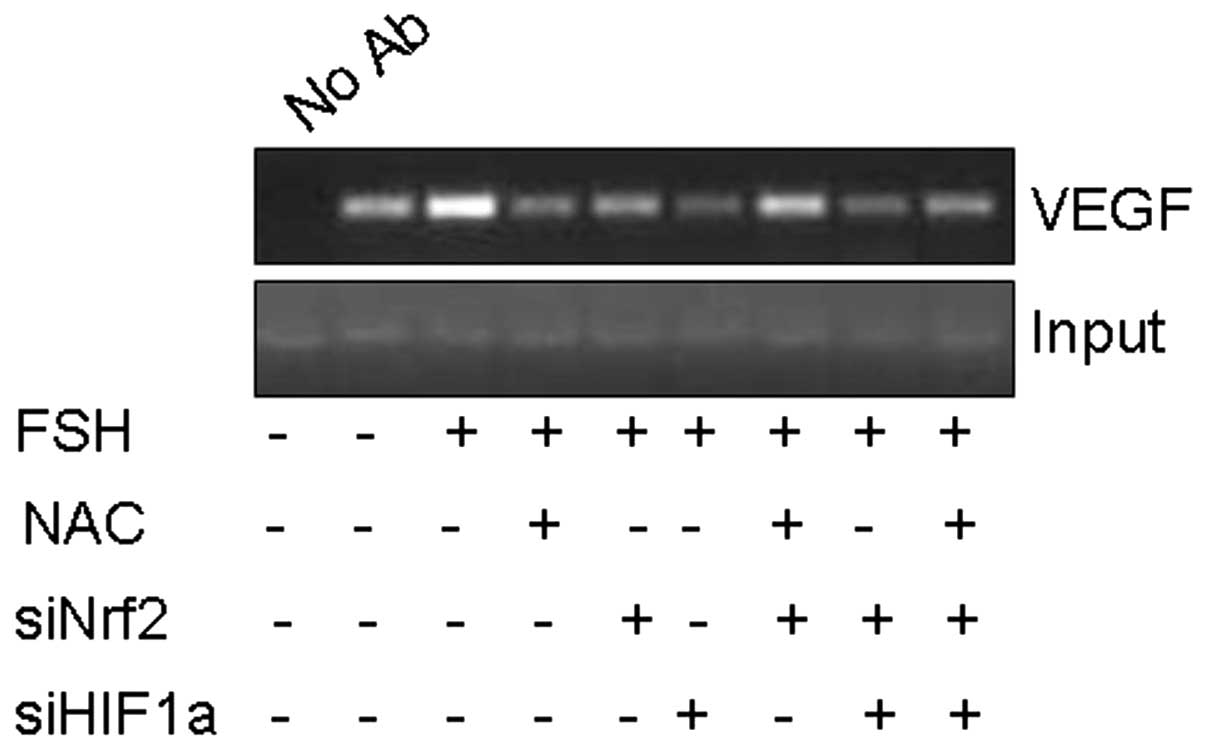|
1
|
Wang J, Luo F, Lu JJ, Chen PK, Liu P and
Zheng W: VEGF expression and enhanced production by gonadotropins
in ovarian epithelial tumors. Int J Cancer. 97:163–167. 2002.
View Article : Google Scholar : PubMed/NCBI
|
|
2
|
Lee B, Kim KH, Jung HJ and Kwon HJ:
Matairesinol inhibits angiogenesis via suppression of mitochondrial
reactive oxygen species. Biochem Biophys Res Commun. 421:76–80.
2012. View Article : Google Scholar : PubMed/NCBI
|
|
3
|
Sauer H and Wartenberg M: Reactive oxygen
species as signaling molecules in cardiovascular differentiation of
embryonic stem cells and tumor-induced angiogenesis. Antioxid Redox
Signal. 7:1423–1434. 2005. View Article : Google Scholar : PubMed/NCBI
|
|
4
|
Ushio-Fukai M and Alexander RW: Reactive
oxygen species as mediators of angiogenesis signaling: role of
NAD(P)H oxidase. Mol Cell Biochem. 264:85–97. 2004. View Article : Google Scholar : PubMed/NCBI
|
|
5
|
Ushio-Fukai M and Nakamura Y: Reactive
oxygen species and angiogenesis: NADPH oxidase as target for cancer
therapy. Cancer Lett. 266:37–52. 2008. View Article : Google Scholar : PubMed/NCBI
|
|
6
|
Xia C, Meng Q, Liu LZ, Rojanasakul Y, Wang
XR and Jiang BH: Reactive oxygen species regulate angiogenesis and
tumor growth through vascular endothelial growth factor. Cancer
Res. 67:10823–10830. 2007. View Article : Google Scholar : PubMed/NCBI
|
|
7
|
Aljhni R, Ibrahim F, Guillaume YC and
Andre C: Reactive oxygen species and nitric oxide effect on the
steroid hormone binding with serum albumin. J Pharm Biomed Anal.
62:129–134. 2012. View Article : Google Scholar : PubMed/NCBI
|
|
8
|
Tada H, Nakashima A, Awaya A, et al:
Effects of thymic hormone on reactive oxygen species-scavengers and
renal function in tacrolimus-induced nephrotoxicity. Life Sci.
70:1213–1223. 2002. View Article : Google Scholar : PubMed/NCBI
|
|
9
|
Choi JS, Paek AR, Kim SY and You HJ: GIPC
mediates the generation of reactive oxygen species and the
regulation of cancer cell proliferation by insulin-like growth
factor-1/IGF-1R signaling. Cancer Lett. 294:254–263. 2010.
View Article : Google Scholar : PubMed/NCBI
|
|
10
|
Liu LZ, Hu XW, Xia C, et al: Reactive
oxygen species regulate epidermal growth factor-induced vascular
endothelial growth factor and hypoxia-inducible factor-1alpha
expression through activation of AKT and P70S6K1 in human ovarian
cancer cells. Free Radic Biol Med. 41:1521–1533. 2006. View Article : Google Scholar
|
|
11
|
Okoh V, Deoraj A and Roy D:
Estrogen-induced reactive oxygen species-mediated signalings
contribute to breast cancer. Biochim Biophys Acta. 1815:115–133.
2011.PubMed/NCBI
|
|
12
|
Shkolnik K, Tadmor A, Ben-Dor S, Nevo N,
Galiani D and Dekel N: Reactive oxygen species are indispensable in
ovulation. Proc Natl Acad Sci USA. 108:1462–1467. 2011. View Article : Google Scholar : PubMed/NCBI
|
|
13
|
Chen W, Sun Z, Wang XJ, et al: Direct
interaction between Nrf2 and p21(Cip1/WAF1) upregulates the
Nrf2-mediated antioxidant response. Mol Cell. 34:663–673. 2009.
View Article : Google Scholar : PubMed/NCBI
|
|
14
|
Sun Z, Chin YE and Zhang DD: Acetylation
of Nrf2 by p300/CBP augments promoter-specific DNA binding of Nrf2
during the antioxidant response. Mol Cell Biol. 29:2658–2672. 2009.
View Article : Google Scholar : PubMed/NCBI
|
|
15
|
Sun Z, Wu T, Zhao F, Lau A, Birch CM and
Zhang DD: KPNA6 (Importin {alpha}7)-mediated nuclear import of
Keap1 represses the Nrf2-dependent antioxidant response. Mol Cell
Biol. 31:1800–1811. 2012.
|
|
16
|
Villeneuve NF, Lau A and Zhang DD:
Regulation of the Nrf2-Keap1 antioxidant response by the ubiquitin
proteasome system: an insight into cullin-ring ubiquitin ligases.
Antioxid Redox Signal. 13:1699–1712. 2012. View Article : Google Scholar : PubMed/NCBI
|
|
17
|
Wang XJ, Sun Z, Chen W, Eblin KE, Gandolfi
JA and Zhang DD: Nrf2 protects human bladder urothelial cells from
arsenite and monomethylarsonous acid toxicity. Toxicol Appl
Pharmacol. 225:206–213. 2007. View Article : Google Scholar : PubMed/NCBI
|
|
18
|
Wang XJ, Sun Z, Villeneuve NF, et al: Nrf2
enhances resistance of cancer cells to chemotherapeutic drugs, the
dark side of Nrf2. Carcinogenesis. 29:1235–1243. 2008. View Article : Google Scholar : PubMed/NCBI
|
|
19
|
Kim TH, Hur EG, Kang SJ, et al: NRF2
blockade suppresses colon tumor angiogenesis by inhibiting
hypoxia-induced activation of HIF-1α. Cancer Res. 71:2260–2275.
2010.PubMed/NCBI
|
|
20
|
Cascio S, D’Andrea A, Ferla R, et al:
miR-20b modulates VEGF expression by targeting HIF-1 alpha and
STAT3 in MCF-7 breast cancer cells. J Cell Physiol. 224:242–249.
2010.PubMed/NCBI
|
|
21
|
Horiuchi A, Imai T, Shimizu M, et al:
Hypoxia-induced changes in the expression of VEGF, HIF-1 alpha and
cell cycle-related molecules in ovarian cancer cells. Anticancer
Res. 22:2697–2702. 2002.PubMed/NCBI
|
|
22
|
Wong C, Wellman TL and Lounsbury KM: VEGF
and HIF-1alpha expression are increased in advanced stages of
epithelial ovarian cancer. Gynecol Oncol. 91:513–517. 2003.
View Article : Google Scholar : PubMed/NCBI
|
|
23
|
Huang Y, Hua K, Zhou X, et al: Activation
of the PI3K/AKT pathway mediates FSH-stimulated VEGF expression in
ovarian serous cystadenocarcinoma. Cell Res. 18:780–791. 2008.
View Article : Google Scholar : PubMed/NCBI
|
|
24
|
Lee J, Park SY, Lee EK, et al: Activation
of hypoxia-inducible factor-1alpha is necessary for
lysophosphatidic acid-induced vascular endothelial growth factor
expression. Clin Cancer Res. 12:6351–6358. 2006. View Article : Google Scholar : PubMed/NCBI
|
|
25
|
Finkel T: Oxidant signals and oxidative
stress. Curr Opin Cell Biol. 15:247–254. 2003. View Article : Google Scholar : PubMed/NCBI
|
|
26
|
Finkel T: Redox-dependent signal
transduction. FEBS Lett. 476:52–54. 2000. View Article : Google Scholar : PubMed/NCBI
|
|
27
|
Griendling KK and Ushio-Fukai M: Reactive
oxygen species as mediators of angiotensin II signaling. Regul
Pept. 91:21–27. 2000. View Article : Google Scholar : PubMed/NCBI
|
|
28
|
Dimmeler S and Zeiher AM: Reactive oxygen
species and vascular cell apoptosis in response to angiotensin II
and pro-atherosclerotic factors. Regul Pept. 90:19–25. 2000.
View Article : Google Scholar : PubMed/NCBI
|
|
29
|
Frank GD, Eguchi S, Yamakawa T, Tanaka S,
Inagami T and Motley ED: Involvement of reactive oxygen species in
the activation of tyrosine kinase and extracellular
signal-regulated kinase by angiotensin II. Endocrinology.
141:3120–3126. 2000.PubMed/NCBI
|
|
30
|
Hannken T, Schroeder R, Zahner G, Stahl RA
and Wolf G: Reactive oxygen species stimulate p44/42
mitogen-activated protein kinase and induce p27(Kip1): role in
angiotensin II-mediated hypertrophy of proximal tubular cells. J Am
Soc Nephrol. 11:1387–1397. 2000.PubMed/NCBI
|
|
31
|
Itoh K, Ishii T, Wakabayashi N and
Yamamoto M: Regulatory mechanisms of cellular response to oxidative
stress. Free Radic Res. 31:319–324. 1999. View Article : Google Scholar : PubMed/NCBI
|
|
32
|
Kensler TW, Wakabayashi N and Biswal S:
Cell survival responses to environmental stresses via the
Keap1-Nrf2-ARE pathway. Annu Rev Pharmacol Toxicol. 47:89–116.
2007. View Article : Google Scholar : PubMed/NCBI
|
|
33
|
Zhang DD: Mechanistic studies of the
Nrf2-Keap1 signaling pathway. Drug Metab Rev. 38:769–789. 2006.
View Article : Google Scholar : PubMed/NCBI
|
|
34
|
Liao H, Zhou Q, Zhang Z, et al: NRF2 is
overexpressed in ovarian epithelial carcinoma and is regulated by
gonadotrophin and sex-steroid hormones. Oncol Rep. 27:1918–1924.
2012.PubMed/NCBI
|
|
35
|
Zhou Q, Liu LZ, Fu B, et al: Reactive
oxygen species regulate insulin-induced VEGF and HIF-1alpha
expression through the activation of p70S6K1 in human prostate
cancer cells. Carcinogenesis. 28:28–37. 2007. View Article : Google Scholar : PubMed/NCBI
|















